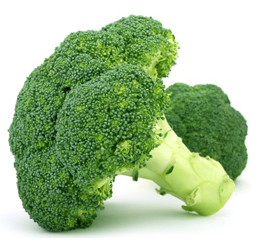Broccoli
Broccoli (Brassica oleracea or Brassica silvestris)
Broccoli is an annual vegetable plant family of cabbage, cauliflower subspecies. The name of this vegetable is derived from the Italian word «brocco» meaning «escape» or «branch».
History and distribution
Broccoli is considered the birthplace of Asia minor and the Eastern Mediterranean. Greeks and Romans ate broccoli even 2000 years ago, but in Europe it became popular only in the 16th century.
In the twenties of the twentieth century this miracle cabbage began gaining attention, both in Europe and in America.
Broccoli now widespread, particularly in England, Spain and Italy. In Russia until now rarely grown.
Description
Broccoli is an annual plant with succulent dark green buds. This cabbage is an early ripening period. Its growing period from seedling to harvesting head is 60-65 days and from transplanting sprouts is 30-35 days.
Broccoli Cauliflower differs from structure, which consists of a head formed buds purple or green. Head diameter comes to 10-12 cm. After cutting the Central head plant begins branched, each branch ends with fine screw. Cut off the head with part of a stalk 10-20 cm long, which is also used for food.
The application of the
Buds are used in food and young stems of broccoli. To maintain useful properties they are minimal: steamed, blanch. After cooking the broccoli should remain crisp.
Broccoli serves as a low-calorie vitamin garnish to meats, poultry, vegetables, added to salads and soups-mashed potatoes.
Composition and properties of
Broccoli contains fiber, potassium, phosphorus, calcium, magnesium, iron, zinc, manganese, sulfur, vitamins c, B1, B2, B5, B6, pp, e, c, pro-vitamin a. Broccoli is a great supplier of vitamins pp, U and beta carotene. By the presence of beta carotene, this culture is many times superior to other vegetables. In addition, broccoli is a rich source of mineral substances on the contents of potassium, calcium, phosphorus, sodium, iron, she competes with cauliflower, surpassing her twice on the content, not only minerals, but also protein.
Chlorophyll, contained in cabbage, has beneficial effects on blood composition. The presence of amino acids in broccoli equates it to beef, and the presence of isoleucine to lysine and protein of chicken eggs. Protein value increases due to the presence of broccoli in it substances that inhibit the accumulation of cholesterol.
Broccoli is considered a healthy vegetable, its reviews in cardiovascular diseases.
Doctors recommend eating broccoli to prevent breakdowns. This cabbage helps to eliminate dangerous to human life, salts of heavy metals, increases the resistance of the human body to radiation. More recently, it became known that broccoli is an excellent prophylactic against cancer.
The study, conducted by doctors from Johns Hopkins College, found that broccoli contains sulforaphane, a special substance that kills the bacteria that cause certain types of stomach ulcers, and also prevents the development of cancer. Moreover, sulforaphane even kills bacteria that are resistant to antibiotics.
Now scientists are trying to develop drugs based on this chemical that would optimally internalised by a human body.
Interesting fact
Broccoli contains the same amount of vitamin c as a lemon.
How to cook broccoli
To keep as many vitamins and minerals, fresh broccoli, you must Cook for no more than 5-7 minutes, put in boiling water. Frozen broccoli is 10-12 minutes.
Calorie and nutrition value of broccoli
Calorie broccoli — 34 kcal.
Food value: protein broccoli-2.82 g, fat-0.37 g, carbohydrates-6.64 g


Leave a Comment